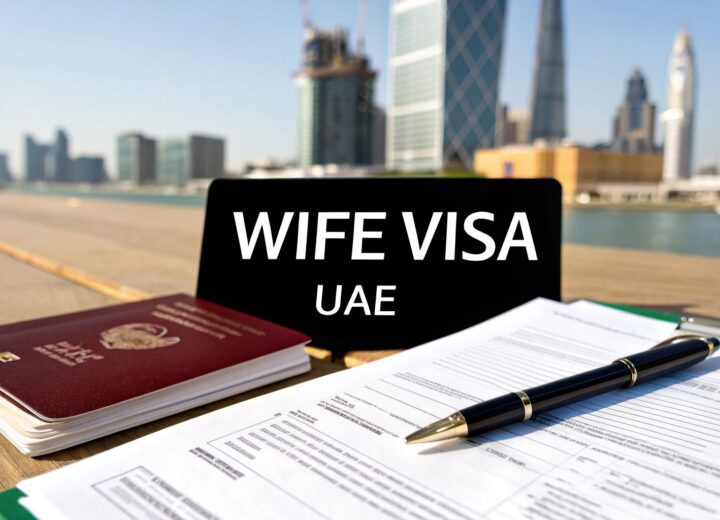Getting a corporate current account in the UAE isn't just another box to tick on your to-do list; it’s the very first step that breathes life into your business. Think of it as plugging your company into the local economy. Without it, you can't pay staff, get paid by clients, or build any kind of financial track record. Your business might exist on paper, but it can’t actually operate.
Why Opening a UAE Bank Account Is Your First Real Hurdle
Once you have that shiny new trade licence in hand, you’ll quickly find that opening a bank account is the first major challenge you’ll face. It’s absolutely essential. You need a local corporate account for just about everything, from taking payments to meeting legal obligations like the Wages Protection System (WPS) for paying your employees.
This process really sets the stage for your entire venture in the UAE. Banks here are modern, but the application process itself is still very traditional and built around strict due diligence. Every bank has to conduct thorough 'Know Your Customer' (KYC) checks to combat financial crime, meaning they'll put your application under a microscope. This is about more than just submitting documents; it’s about proving your business is legitimate, has a solid plan, and is transparent.
Getting to Grips With the Banking Scene
It can feel like an uphill battle, but it's completely doable if you're prepared. The secret is knowing what the banks are actually looking for: a convincing business plan, a clear source of funds, and a straightforward company structure. The requirements also change quite a bit depending on whether you're set up on the mainland or in a free zone, and that's where having an expert on your side makes all the difference.
For example, a mainland trading company will get asked very different questions compared to a tech startup in a free zone. Working with specialists in Mainland Company Formation in Dubai, Sharjah & Abu Dhabi or in freezone company formation across the UAE gives you a huge advantage because they know exactly what each bank wants to see.
Securing a corporate bank account is the moment your business goes from being an idea on paper to a real, functioning enterprise. It’s the final link that lets you trade, invest, and grow in one of the world's most exciting economies.
To help you see the path ahead, it's useful to look at the whole process in stages. Each one has its own goal and potential roadblocks, but knowing what’s coming can save you a lot of time and headaches.
Key Stages of UAE Corporate Account Opening
Here's a quick look at the main phases you'll go through to get your corporate account up and running.
| Phase | Primary Objective | Common Challenge |
|---|---|---|
| Preparation | To gather all your company and personal documents, ensuring everything is perfect. | Small inconsistencies between your trade licence, MOA, and business plan. |
| Submission | To get your application into your chosen bank and clear the initial screening. | A vague business model description that triggers compliance concerns. |
| Verification | To ace the KYC interview and answer all the bank's compliance questions. | Struggling to explain your source of funds or expected transactions clearly. |
| Approval | To get the final green light and have your corporate account activated. | Unforeseen delays caused by the bank’s internal backlogs or queries. |
Nailing each of these stages is crucial. A mistake in the preparation phase can cause a domino effect, leading to frustrating delays down the line.
Getting Your Paperwork in Order

From my experience, I can tell you the single biggest hurdle in opening a corporate current account isn't the bank meeting—it's the paperwork. An incomplete or inconsistent document file is the number one reason for delays and rejections.
Before you even think about which bank to approach, your focus should be on assembling a flawless set of documents. Think of it as building a case for your business. Every piece of paper, from your trade licence to your business plan, must tell the same clear, coherent story.
Even a tiny discrepancy can grind the entire process to a halt. Something as simple as a slight name variation for a shareholder across two documents or a business activity mentioned in one but not another is a huge red flag for a compliance officer.
The Company's Story: Your Corporate Documents
First up are the documents that define your business entity itself. Banks pore over these to understand your company's legal standing, its purpose, and its legitimacy here in the UAE.
Here’s what you absolutely must have ready:
- Valid Trade Licence: This is your golden ticket, proving you’re legally registered to do business. Make sure it's up-to-date and lists every single business activity you undertake.
- Certificate of Incorporation/Registration: This confirms your company legally exists, which is especially critical for free zone setups.
- Memorandum of Association (MOA): The MOA is the rulebook for your company. It details the shareholders and their ownership stakes, and banks scrutinise it to confirm who has the authority to open and manage the account.
- Share Certificate(s): This is the official proof of ownership. The names and percentages here must match your MOA and trade licence perfectly.
- Company Office Tenancy Contract (Ejari): Banks need to see that you have a real physical presence in the UAE. A virtual office address is often a deal-breaker for their compliance teams.
A common tripwire I see is when another company is a shareholder. For instance, if your new Dubai company is owned by your firm back in the UK, you’ll need to provide the full set of attested corporate documents for the parent company too. This adds a layer of complexity that needs to be managed from the start.
Your business plan is more than just a formality; it's your chance to tell your company's story. It should clearly explain your business model, who your customers are, your revenue projections, and—crucially—the nature of the payments you expect to send and receive.
Getting these documents right is non-negotiable. Presentation is also key. Banks often require legal translation into Arabic and proper attestation. This is where leaning on specialists in Corporate PRO Services and Attestation Services can save you a world of headaches, ensuring every page meets the bank’s exact standards.
The People Behind the Business: Personal Documents
Next, the bank will perform its due diligence on every person connected to the business. This is a non-negotiable part of their Know Your Customer (KYC) and Anti-Money Laundering (AML) checks.
For every single shareholder, director, and account signatory, you’ll need:
- Passport Copy: A crystal-clear copy is essential, and it must have at least six months of validity remaining.
- UAE Residence Visa & Emirates ID Copy: These are mandatory for anyone residing in the UAE. The visa must be sponsored by the company applying for the account. Our specialists can also assist with your Golden Visa on Property and Investor Visa needs.
- Recent Utility Bill: This is the standard proof of address for each individual in their country of residence. It can't be more than three months old.
- Personal Bank Statements: Most banks want to see the last three to six months of personal statements to get a sense of an individual's financial background.
- Curriculum Vitae (CV): A professional CV for the main account signatory helps the bank understand their industry experience and credibility in running this specific business.
Absolute consistency is the name of the game here. The name on the passport must be an exact match to the name on the utility bill, the visa, and all company documents.
To get a head start, you can find helpful business documentation templates that will help you organise everything logically. By meticulously gathering and cross-referencing this checklist, you’re not just submitting an application—you’re building a strong foundation for a fast and successful approval.
Choosing the Right Banking Partner
Picking a bank for your business in the UAE isn't just another item on your to-do list; it's a strategic move that will define your day-to-day operations and future growth. The right banking relationship can feel like a genuine partnership, smoothing out cash flow and opening up opportunities. The wrong one? It can be a constant source of friction.
This decision is a cornerstone of the current account opening process, so it pays to be deliberate. Don't just go with the biggest name you recognise. A bank that’s perfect for a massive mainland corporation might be a terrible fit for a lean tech startup in a free zone. You need to look past the glossy ads and dig into what really matters for your business.
Key Factors for Comparing UAE Banks
Before you even think about filling out an application, you need to know what you're looking for. Think of it as creating a scorecard for your ideal bank. Are you a global trading company constantly moving money across borders, or a local service business with mostly AED transactions? The answer completely changes the game.
Here are the non-negotiables to consider:
- Minimum Balance Requirements: This is the classic stumbling block for new businesses. Some of the big, traditional banks might ask you to maintain an average monthly balance of AED 50,000 or more, hitting you with hefty penalties if you dip below. On the other hand, many newer digital banks or SME-focused accounts boast zero-balance options, but always read the fine print for hidden monthly service fees.
- International Transfer Fees & FX Rates: If you work with clients or suppliers outside the UAE, this is critical. High fees on wire transfers and uncompetitive foreign exchange (FX) rates can slowly bleed your profits. You have to compare the real cost of both sending and receiving money in the currencies you use most often.
- Online and Mobile Banking Platforms: Let's be honest, a clunky and outdated online portal is more than an annoyance—it's a liability. Really test out (or at least get a good demo of) each bank's digital tools. Can you process batch payments with ease? Can you set different permissions for your team members? The best platforms are intuitive and powerful. You can read more on how digital innovation in the banking sector is reshaping what businesses should expect.
- Access to a Relationship Manager: For many entrepreneurs, this is the deal-breaker. Having a dedicated relationship manager—a real person you can call—is invaluable. They can help push things through, solve unexpected problems, and introduce you to other services like trade finance or loans when you're ready to scale.
As you gather your paperwork, you'll quickly notice that banks scrutinise both the business and the people behind it.

This image perfectly illustrates the dual focus of the banks' due diligence: 50% on your company's credentials and 50% on the personal identity and background of its owners and managers. Both sides of the coin have to be solid.
How UAE Banks Compare for New Businesses
Finding the right fit means understanding the different types of banks operating in the UAE. Each category has its own strengths and is geared towards a different kind of business. This table gives you a quick snapshot.
| Feature | Traditional Local Banks | International Banks | Digital Banks |
|---|---|---|---|
| Best For | Mainland trading, retail, large-scale operations. | Businesses with strong ties to the bank's home country. | Startups, freelancers, tech companies, service-based businesses. |
| Minimum Balance | Often high (AED 50k+). Can be a major hurdle. | Varies, but can also be quite high. | Often low or zero-balance options, which is great for cash flow. |
| Branch Access | Extensive network across the UAE. | Limited physical presence, usually in major business hubs. | No physical branches; all services are handled online or via app. |
| International Transfers | Strong capabilities but can be expensive. | Excellent global network, often with better rates and faster service. | Fast and low-cost transfers, but sometimes with daily limits. |
| Relationship Manager | Usually available, especially for high-value accounts. | Typically provided, offering a key point of contact. | Limited or non-existent; support is primarily through digital channels. |
| Account Opening Speed | Can be slow and bureaucratic. | Often faster than local banks but still thorough in their checks. | Very fast—some accounts can be opened in a matter of days. |
Ultimately, the choice comes down to your specific needs. If you need in-person services and complex trade finance, a traditional bank is probably your best bet. If you value speed, low costs, and a slick digital experience, a digital bank is likely the way to go.
Matching the Bank to Your Business Model
The simple truth is that not all banks are interested in all types of businesses. Knowing this from the start can save you weeks of wasted time and effort. The real secret to a successful current account opening is finding a bank that actually understands and wants your business.
For example, a new FZCO (Free Zone Company) in the software industry will probably get a much warmer welcome from a bank with a dedicated tech startup programme. They "get" a business model that doesn't involve physical inventory and are often more flexible on things like minimum balance.
Contrast that with a mainland LLC in general trading. That company will be much better served by a large, established local bank with a deep understanding of trade finance, letters of credit, and managing high-volume transactions.
The best bank for your business isn’t the one with the biggest logo; it's the one whose services and risk appetite are a perfect match for your operational needs and future plans.
To make it more concrete, here’s how you might think about it:
- Startups and Tech Companies: Focus on digital-first banks or the SME divisions of traditional banks. They're more likely to offer integrated accounting tools and understand innovative business models.
- International Trading Firms: Your priority list should be topped by banks with a strong global footprint, competitive FX rates, and an experienced trade finance team. Their expertise is gold.
- Consultancies and Service-Based Businesses: Your needs are often simpler. Look for low transaction fees, a great online banking experience, and, ideally, no minimum balance requirement.
- Mainland Retail or F&B Businesses: You'll need a bank with a solid local branch network for cash and cheque deposits. Easy access to physical banking is key for your daily operations.
Don't just think about where your business is today. Where do you see it in two or three years? Choosing a banking partner is a long-term decision, and getting it right from the start will save you countless headaches down the road.
From Application to Approval: What Really Happens Behind the Scenes

So, you've submitted your meticulously prepared application. Now what? This is where the real waiting game starts, and frankly, it can be the most frustrating part of the entire current account opening process. Your file has essentially entered a black box, moving from one department to the next inside the bank.
First, there's a basic check. Someone quickly scans your file to see if everything is there. If even one document is missing, it gets kicked right back to you, and the clock resets. This is precisely why we stress getting that initial checklist perfect—it's your ticket past the first gatekeeper.
After that initial screening, your application goes to the compliance department. This is the big one. Compliance officers are the bank's risk managers, and their job is to scrutinise every single detail of your business. They're making sure you comply with the UAE's stringent anti-money laundering (AML) and counter-terrorism financing (CTF) rules. Any grey areas or confusing information here will bring your application to a grinding halt.
The Make-or-Break KYC Meeting
If the compliance team gives your paperwork the initial nod, you’ll be invited for a 'Know Your Customer' (KYC) interview. This is your chance to put a face to the name and really sell your business vision. It might be in person or over a video call, but the goal is the same: convince the bank you're a credible, transparent, and low-risk partner.
Be prepared to speak confidently and clearly on three core topics:
- Your Business Model: What do you actually do? Who do you sell to? How does the money flow? Ditch the corporate jargon and explain it like you would to a friend.
- Source of Funds: Where did the startup capital come from? Be ready with bank statements or loan agreements to prove it. This is non-negotiable.
- Your Transactions: Give them a realistic picture of your expected monthly turnover. Are you dealing with local AED payments, or will you be sending and receiving international transfers in USD or EUR? Be specific.
Treat the KYC meeting less like an interrogation and more like a pitch to a cautious investor. Clarity and confidence go a long way. For a deeper dive, check out our complete guide on opening a https://prodesk.ae/business-bank-account-dubai/.
How Long Will It Actually Take?
This is the million-dirham question. The honest-to-goodness answer is: it depends. A current account opening can take anywhere from a couple of weeks to well over three months. The timeline is influenced by the bank's internal backlog, how complex your shareholding structure is, and even the nationalities of the owners.
Don’t just sit and wait. The waiting period should be an active one. A silent application is often a stalled one. You have to keep the momentum going with proactive follow-up.
This is where having an expert in your corner really pays off. Instead of you chasing a generic call centre for updates, a seasoned professional is managing the entire conversation. They know who to talk to, how to respond to compliance queries correctly, and how to make sure your file doesn't end up lost in a pile.
Having this kind of consistent oversight is a game-changer. With a professional team, you essentially get a 24/7 support service dedicated to keeping your application moving—we are always here when you need us. While the final approval always lies with the bank, having an advocate who pushes your case forward day after day dramatically shortens the timeline and makes a 'yes' far more likely.
Common Pitfalls and How to Avoid Them

Opening a current account in the UAE can feel like a walk in the park one minute and a trek through a minefield the next. Having guided countless businesses through this process, we’ve seen the same mistakes trip up even the sharpest entrepreneurs. The secret to a smooth approval isn't luck; it's knowing what the banks are looking for and getting ahead of their questions.
Most applications get stuck in a few common traps: a business plan that’s all sizzle and no steak, messy paperwork with tiny inconsistencies, or a murky explanation for the source of your funds. Any one of these can stall your application for weeks or lead to a flat-out rejection.
But here’s the good news—every single one of these issues is avoidable. Once you understand the mindset of a bank's compliance officer, you can build an application that ticks all their boxes from day one.
Vague Business Plan and Unclear Model
We see it all the time: business plans full of ambitious marketing speak that say very little about the actual business. Remember, you're not pitching to a venture capitalist; you're providing information to a risk assessor. They need to understand, in simple terms, how money flows into and out of your company.
To cut through the noise, make sure your executive summary immediately answers three core questions:
- What problem do you solve? Nail this down in a single sentence.
- Who are your clients? Be specific. Mention your target market and even a few potential key clients if you can.
- How will money move? Will you be dealing with a few large international transfers or many small local payments?
For instance, instead of saying, "We are a dynamic digital marketing agency," try this: "We provide SEO and content marketing services to F&B businesses in Dubai, receiving monthly retainer payments in AED via local bank transfers." That simple change gives a compliance officer the concrete details they need to move forward.
Inconsistent Documentation
This is probably the most frustrating pitfall because it’s caused by tiny, administrative errors. A shareholder's name spelled slightly differently on their passport versus the Memorandum of Association, or an office address that doesn't perfectly match your trade licence—these are the kinds of things that can grind the whole process to a halt.
Bank systems are designed to flag these discrepancies instantly.
The fix is tedious but essential. Create a master sheet with the official, legally correct details for every shareholder and the company. Then, go through every single document—passport copies, MOAs, trade licences—and check them against that master sheet. This one-hour exercise can easily save you a month of frustrating back-and-forth emails.
Key Takeaway: Banks have a zero-tolerance policy for discrepancies. Your application documents should tell one consistent story. Any variation looks unprofessional at best and can be misinterpreted as deceptive at worst.
The Source of Funds Dilemma
You’ll hear the term "Source of Funds" (SOF) a lot. UAE banks are legally mandated to verify where your initial investment capital came from to combat money laundering. Just writing "personal savings" on a form won't cut it anymore. You need to provide a clear paper trail.
Here’s what they typically expect:
- For Personal Savings: Supply six months of personal bank statements that show the money accumulating over time.
- For a Loan: Provide the official loan agreement, whether it's from a bank or a private individual.
- From Selling an Asset: Show the signed contract of sale for the property, vehicle, or other asset.
Don't wait for them to ask. Prepare a short, one-page letter explaining your SOF and attach the supporting documents right from the start. This proactive step shows transparency and immediately satisfies one of the compliance team's biggest requirements. It's a cornerstone of the cost-effective business setup solutions tailored to your needs that we provide, ensuring you get it right the first time.
Getting this right is a fundamental step, as we cover in our guide on how to start a business in the UAE.
What to Do After Your UAE Bank Account is Approved
Getting that corporate account number is a huge win, but it's really just the starting line. Now, the real work begins: managing your account in a way that fuels your business growth and keeps you in good standing with the bank.
From day one, think about building a healthy, transparent relationship with your bank. They'll be watching your account activity to make sure it aligns with the business you told them you were running. If you registered as a marketing consultancy but suddenly start receiving huge, regular payments from a commodities trader, that's a red flag. Expect a call.
A simple rule of thumb? Communicate. If you know a big, unusual payment is about to hit your account, give your relationship manager a heads-up. It saves everyone a lot of trouble.
Turning Your Account into a Growth Engine
With the account up and running, you can start plugging into the UAE's business ecosystem. If you have staff, your immediate next step is registering for the Wages Protection System (WPS) to handle payroll—this is mandatory.
Your account is now the central hub for your finances. This is the perfect time to get your financial house in order. Good bookkeeping isn't just for tax season; it gives you the clarity you need to make smart decisions. To get started, you can simplify your finances with these small business bookkeeping tips.
This kind of financial discipline is what separates businesses that struggle from those that scale.
Your UAE corporate bank account is more than just a place to hold money. It's your key to unlocking trade finance, managing cash flow effectively, and structuring your business to take full advantage of the UAE's incredible economic environment.
This is where you can truly enjoy UAE tax benefits for international entrepreneurs. By running all your business income and expenses through your local account, you build a clear financial history. This record is proof of your economic substance in the UAE, which is absolutely essential for benefiting from the 0% corporate tax on qualifying income. A smooth process—from company formation right through to a fully active bank account—paves the way for long-term success here.
Your Questions Answered
When you're setting up a business in the UAE, the banking part of the journey always raises a few questions. We get asked the same things every day, so let's clear up some of the most common points right now.
Can I Open a UAE Corporate Bank Account from My Home Country?
The short answer is almost always no. UAE banks operate under very strict Know Your Customer (KYC) rules, which means the main person signing for the account has to be physically present in the UAE for the final steps.
You can definitely get the ball rolling from overseas with our help, but you'll need to plan for at least one trip here to meet the bankers and sign the final papers. There’s really no getting around that in-person meeting.
What’s the Typical Minimum Balance I Need to Keep in the Account?
This is a big one, and the answer varies wildly between banks. It's something you absolutely need to check before you apply.
The big, traditional banks might ask you to maintain an average monthly balance anywhere from AED 25,000 to as high as AED 250,000. On the flip side, some newer digital banks or accounts designed for small businesses might offer zero-balance options. Just be aware that these often have their own trade-offs, like higher fees for certain transactions.
Choosing the right bank isn't just about the brand; it's about finding a minimum balance that won't strain your cash flow, especially when your business is just getting started.
How Long Does It Realistically Take to Get the Account Open?
Patience is key here. You should budget for anywhere from two weeks to three months. The timeline really depends on a few things: how busy the bank is, how complex your business or ownership structure is, and how clean your paperwork is. Even the nationalities of the shareholders can sometimes affect the speed.
The best way to speed things up? Make sure your application is perfect from day one. A complete, professionally prepared file with no inconsistencies is your ticket to avoiding the endless back-and-forth with the bank's compliance team—that's what causes most of the delays.
Ready to tackle the UAE's banking world with an expert by your side? PRO Deskk helps with everything from mainland and free zone company formation to getting your corporate bank account sorted. Let us handle the red tape so you can get back to what you do best.
📞 Call Us Now: +971-54-4710034 or WhatsApp Us Today for a Free Consultation.





